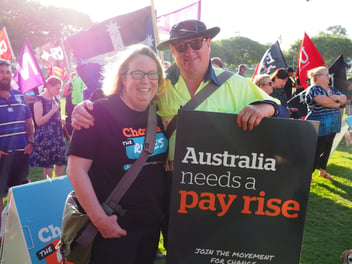Increased coal royalties should fund essential service delivery and fair wage rises
Increasing revenue from coal royalties is the answer to relieving sustained pressure on Queensland’s essential services and the workers who deliver them, unions say.
Queensland Council of Unions Assistant General Secretary Jacqueline King said Queenslanders deserve quality health care, education, public safety, and mental health services.
“That can’t happen unless we also have a workforce that is trained and skilled and paid fairly.
“The heroes of COVID – those working in our hospitals, schools and to keep Queenslanders safe – are under now even more pressure to deliver quality services,” she said.
But after two years of the pandemic and now the cost of living crisis, these services are at breaking point.
Cancelled elective surgeries, ambulance ramping, and shortages of teachers and other essential workers have been reported across every region in Queensland.
Interstate migrants have also been moving to Queensland and it’s estimated the state’s population will top six million by 2030, putting more demand on existing services and the essential workers who deliver them.
“Health care, schools and public safety are under extreme pressure. Only significant investment in our essential services and workers will keep us recovering and growing,” she said.
“There’s also a critical need for increased funding for mental health services so vulnerable Queenslanders can get the care they need.”
Unions believe some of this funding must come from increasing coal royalties.
“Current and projected revenue for our mining resources has never been higher but it’s mainly multinationals who are pocketing the profits from Queensland’s minerals and resources,” said Ms King.
“As our population increases and the economy rebounds, the state government must invest in providing the best essential services for Queenslanders and pay fair wages to its workers.”
Ms King said Queenslanders, no matter where they live, deserve quality essential services and unions would campaign fiercely for those services and fair wages.
“The 21 June Budget must set out a long-term plan to retain and recruit essential workers so Queenslanders have quality public services into the future. A short-term fix won’t do the job.
“We need a smarter strategy that ensures Queenslanders continue to have the best essential services in the country,” she said.
“Our essential workers deserve much more than just a ‘thank you’, which is why unions are calling for a 5.1 per cent per annum increase for all public sector workers.”
She said this week’s increase to federal award wages of 4.6 per cent was based on the sharp increase in the cost of living and forecast labour market improvements.
“Even the Fair Work Commission said that last year’s increase of 2.5 per cent represented a real wage reduction for workers.”
It showed that employers need to recognise and respond to the cost of living pressures on their workers, and the need to attract and retain skilled workers in a tight labour market.
The Queensland Government needs to respond to the combined union claim with a real wages offer, she said.



